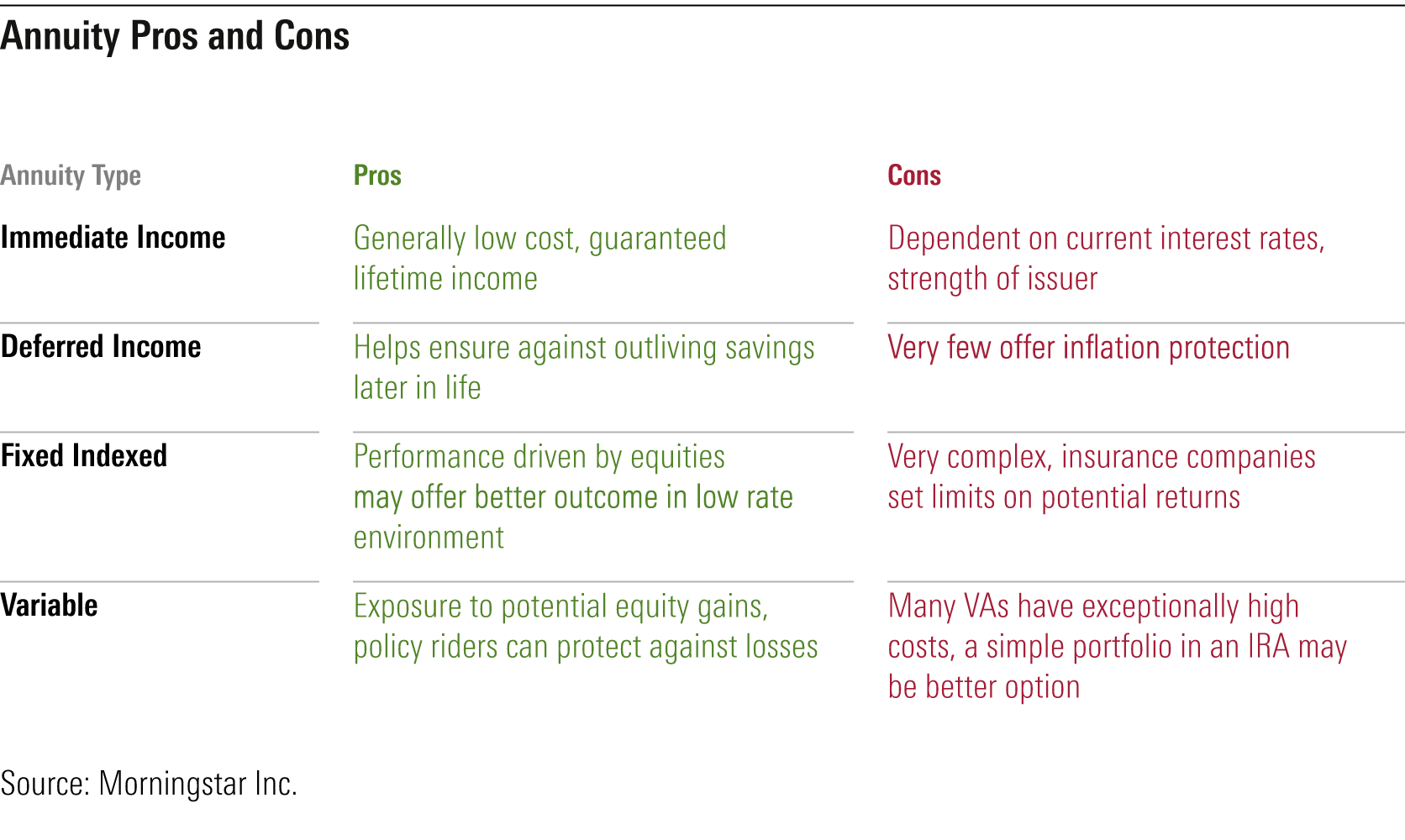All Categories
Featured
Table of Contents
The efficiency of those funds will establish exactly how the account grows and exactly how huge a payment the customer will ultimately receive.
If an annuity buyer is married, they can choose an annuity that will continue to pay revenue to their partner should they pass away. Annuities' payments can be either immediate or delayed. The basic inquiry you need to take into consideration is whether you desire routine earnings now or at some future date.
A credit enables the money in the account even more time to expand. And just like a 401(k) or an individual retired life account (IRA), the annuity continues to collect revenues tax-free till the cash is taken out. With time, that might develop right into a significant amount and cause larger payments.
With a prompt annuity, the payments begin as quickly as the customer makes a lump-sum repayment to the insurance provider. There are some other crucial choices to make in getting an annuity, depending on your situations. These include the following: Buyers can schedule payments for 10 or 15 years, or for the remainder of their life.
Understanding Financial Strategies Key Insights on Your Financial Future Defining Retirement Income Fixed Vs Variable Annuity Pros and Cons of Various Financial Options Why Fixed Vs Variable Annuities Can Impact Your Future Tax Benefits Of Fixed Vs Variable Annuities: Explained in Detail Key Differences Between Fixed Vs Variable Annuity Understanding the Risks of Long-Term Investments Who Should Consider Strategic Financial Planning? Tips for Choosing the Best Investment Strategy FAQs About Planning Your Financial Future Common Mistakes to Avoid When Choosing a Financial Strategy Financial Planning Simplified: Understanding Your Options A Beginner’s Guide to Smart Investment Decisions A Closer Look at Indexed Annuity Vs Fixed Annuity
That may make sense, for example, if you require a revenue boost while settling the last years of your mortgage. If you're wed, you can select an annuity that spends for the remainder of your life or for the rest of your partner's life, whichever is much longer. The latter is typically described as a joint and survivor annuity.
The choice between deferred and immediate annuity payments depends mainly on one's cost savings and future earnings objectives. Immediate payments can be valuable if you are already retired and you require an income source to cover day-to-day expenses. Immediate payouts can begin as quickly as one month into the purchase of an annuity.
People typically buy annuities to have a retired life earnings or to build cost savings for an additional function. You can purchase an annuity from a certified life insurance agent, insurer, monetary planner, or broker. You should speak with a monetary advisor regarding your requirements and objectives before you acquire an annuity.
The distinction between both is when annuity repayments start. permit you to save money for retirement or various other factors. You do not have to pay taxes on your incomes, or contributions if your annuity is an individual retired life account (INDIVIDUAL RETIREMENT ACCOUNT), until you withdraw the revenues. permit you to create an earnings stream.

Deferred and instant annuities offer a number of options you can choose from. The options supply various levels of prospective danger and return: are ensured to earn a minimum rate of interest rate. They are the lowest economic risk yet give lower returns. gain a greater rate of interest, yet there isn't a guaranteed minimum rates of interest.
allow you to choose between sub accounts that resemble mutual funds. You can make much more, yet there isn't an assured return. Variable annuities are higher threat because there's a chance you might lose some or all of your money. Set annuities aren't as high-risk as variable annuities since the investment risk is with the insurance policy company, not you.
Understanding Annuities Fixed Vs Variable A Closer Look at How Retirement Planning Works Defining Fixed Vs Variable Annuities Advantages and Disadvantages of Tax Benefits Of Fixed Vs Variable Annuities Why Pros And Cons Of Fixed Annuity And Variable Annuity Is Worth Considering How to Compare Different Investment Plans: Simplified Key Differences Between Different Financial Strategies Understanding the Key Features of Long-Term Investments Who Should Consider Strategic Financial Planning? Tips for Choosing Annuities Variable Vs Fixed FAQs About Planning Your Financial Future Common Mistakes to Avoid When Planning Your Retirement Financial Planning Simplified: Understanding Indexed Annuity Vs Fixed Annuity A Beginner’s Guide to Smart Investment Decisions A Closer Look at Fixed Income Annuity Vs Variable Growth Annuity
If performance is low, the insurance firm births the loss. Fixed annuities ensure a minimum rate of interest rate, usually in between 1% and 3%. The business might pay a higher rates of interest than the guaranteed passion rate. The insurer establishes the rates of interest, which can transform month-to-month, quarterly, semiannually, or every year.
Index-linked annuities show gains or losses based on returns in indexes. Index-linked annuities are extra complex than taken care of deferred annuities.
Understanding Fixed Indexed Annuity Vs Market-variable Annuity Everything You Need to Know About Financial Strategies Breaking Down the Basics of Investment Plans Pros and Cons of Indexed Annuity Vs Fixed Annuity Why Indexed Annuity Vs Fixed Annuity Is Worth Considering How to Compare Different Investment Plans: A Complete Overview Key Differences Between Fixed Vs Variable Annuities Understanding the Rewards of Fixed Index Annuity Vs Variable Annuity Who Should Consider Strategic Financial Planning? Tips for Choosing the Best Investment Strategy FAQs About Planning Your Financial Future Common Mistakes to Avoid When Planning Your Retirement Financial Planning Simplified: Understanding Your Options A Beginner’s Guide to Smart Investment Decisions A Closer Look at What Is Variable Annuity Vs Fixed Annuity
Each relies upon the index term, which is when the company calculates the interest and credits it to your annuity. The figures out just how much of the boost in the index will certainly be utilized to compute the index-linked interest. Various other essential functions of indexed annuities include: Some annuities top the index-linked rate of interest.
The floor is the minimal index-linked rates of interest you will make. Not all annuities have a flooring. All dealt with annuities have a minimal guaranteed value. Some companies use the standard of an index's worth instead of the worth of the index on a specified date. The index averaging may take place whenever throughout the term of the annuity.
Breaking Down Your Investment Choices A Comprehensive Guide to Fixed Annuity Or Variable Annuity What Is the Best Retirement Option? Advantages and Disadvantages of Different Retirement Plans Why Choosing the Right Financial Strategy Matters for Retirement Planning How to Compare Different Investment Plans: How It Works Key Differences Between Different Financial Strategies Understanding the Rewards of Tax Benefits Of Fixed Vs Variable Annuities Who Should Consider What Is A Variable Annuity Vs A Fixed Annuity? Tips for Choosing Annuity Fixed Vs Variable FAQs About Variable Annuities Vs Fixed Annuities Common Mistakes to Avoid When Planning Your Retirement Financial Planning Simplified: Understanding Fixed Index Annuity Vs Variable Annuities A Beginner’s Guide to Smart Investment Decisions A Closer Look at Retirement Income Fixed Vs Variable Annuity
The index-linked passion is added to your original premium quantity yet does not compound during the term. Other annuities pay compound interest during a term. Substance interest is rate of interest made on the cash you saved and the rate of interest you gain. This suggests that rate of interest currently credited also makes rate of interest. In either case, the passion gained in one term is usually compounded in the next.
If you take out all your cash prior to the end of the term, some annuities will not credit the index-linked rate of interest. Some annuities might attribute only part of the passion.
This is because you birth the financial investment threat as opposed to the insurance provider. Your representative or economic adviser can assist you choose whether a variable annuity is appropriate for you. The Securities and Exchange Compensation categorizes variable annuities as safety and securities due to the fact that the performance is obtained from supplies, bonds, and various other financial investments.

An annuity agreement has two phases: a buildup stage and a payment phase. You have a number of options on how you add to an annuity, depending on the annuity you get: permit you to select the time and amount of the payment.
permit you to make the exact same repayment at the very same interval, either monthly, quarterly, or yearly. The Internal Income Service (IRS) manages the taxes of annuities. The internal revenue service enables you to delay the tax obligation on profits till you withdraw them. If you withdraw your earnings before age 59, you will probably have to pay a 10% very early withdrawal penalty in enhancement to the tax obligations you owe on the passion earned.
After the build-up phase ends, an annuity enters its payment phase. There are several options for getting payments from your annuity: Your company pays you a taken care of amount for the time stated in the agreement.
Understanding Financial Strategies A Closer Look at Fixed Annuity Vs Variable Annuity What Is the Best Retirement Option? Features of Variable Annuity Vs Fixed Indexed Annuity Why Fixed Income Annuity Vs Variable Growth Annuity Is Worth Considering How to Compare Different Investment Plans: How It Works Key Differences Between Fixed Annuity Or Variable Annuity Understanding the Rewards of Long-Term Investments Who Should Consider Fixed Vs Variable Annuity? Tips for Choosing Fixed Vs Variable Annuity FAQs About Fixed Income Annuity Vs Variable Annuity Common Mistakes to Avoid When Planning Your Retirement Financial Planning Simplified: Understanding Your Options A Beginner’s Guide to Smart Investment Decisions A Closer Look at Deferred Annuity Vs Variable Annuity
Many annuities charge a charge if you withdraw cash prior to the payout phase. This penalty, called an abandonment charge, is normally greatest in the early years of the annuity. The fee is typically a percent of the withdrawn money, and usually begins at around 10% and goes down yearly till the surrender duration is over.

Annuities have actually other costs called lots or compensations. Sometimes, these charges can be as much as 2% of an annuity's value.
Variable annuities have the potential for greater earnings, yet there's more threat that you'll lose cash. Be cautious concerning placing all your possessions right into an annuity.
Take some time to choose. Annuities sold in Texas must have a 20-day free-look period. Replacement annuities have a 30-day free-look duration. During the free-look duration, you might cancel the agreement and get a full refund. An economic adviser can aid you evaluate the annuity and compare it to various other investments.
Table of Contents
Latest Posts
Understanding Financial Strategies A Closer Look at How Retirement Planning Works What Is the Best Retirement Option? Benefits of Immediate Fixed Annuity Vs Variable Annuity Why Choosing the Right Fin
Exploring Fixed Vs Variable Annuity Pros Cons A Comprehensive Guide to Fixed Indexed Annuity Vs Market-variable Annuity Breaking Down the Basics of Retirement Income Fixed Vs Variable Annuity Pros and
Decoding Fixed Vs Variable Annuity Pros Cons A Closer Look at How Retirement Planning Works Breaking Down the Basics of Investment Plans Features of Smart Investment Choices Why Fixed Annuity Vs Equit
More
Latest Posts